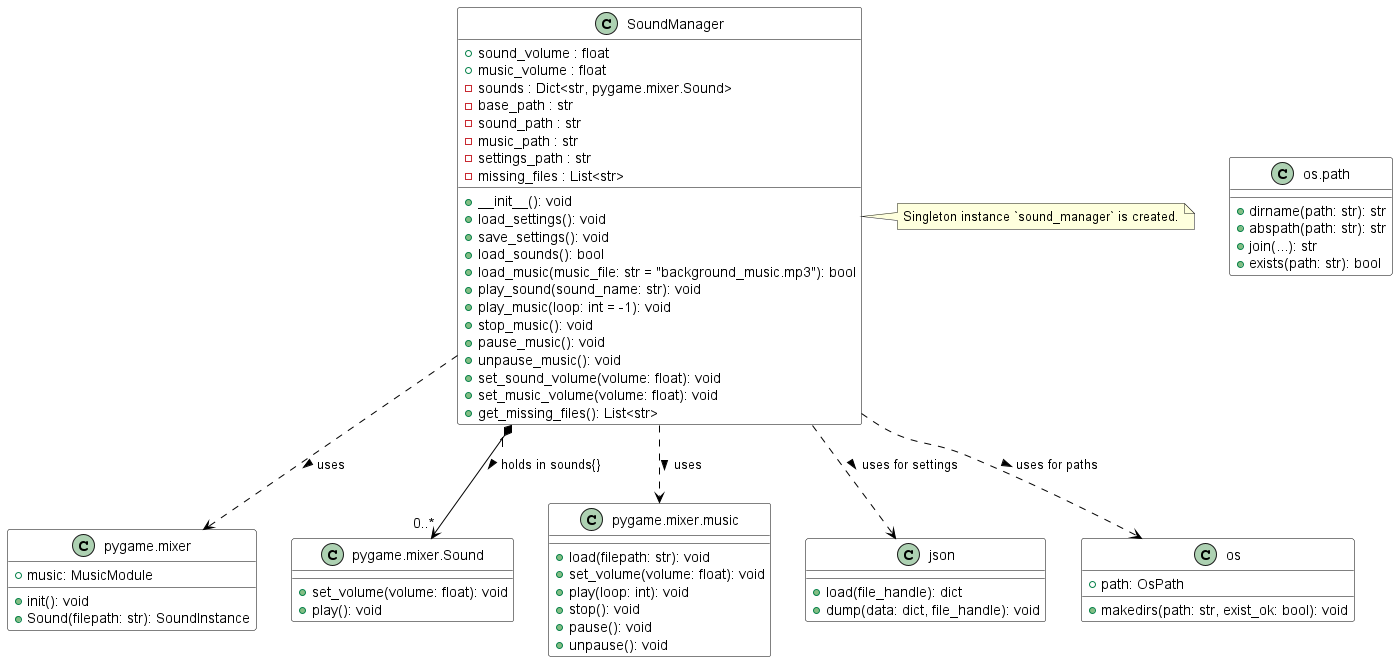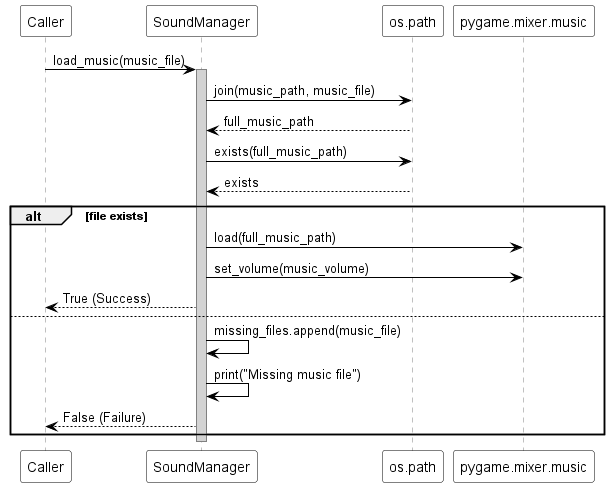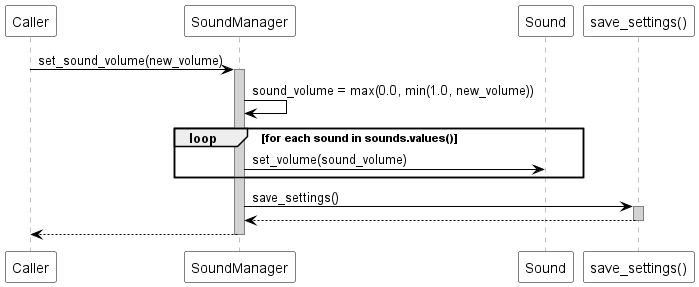Sound Manager Module
This module provides a centralized SoundManager class for loading, playing, and managing sound effects and background music in the game. It handles volume control, settings persistence (via settings.json), and provides a simple interface for playing various game sounds identified by logical names.
The Sound Manager is responsible for:
Initializing the Pygame mixer.
Loading sound effect files (.mp3) into memory, associated with specific names (e.g., “dice_roll”, “buy_property”).
Loading background music files.
Playing loaded sound effects on demand.
Playing, stopping, pausing, and unpausing background music.
Managing separate volume levels for sound effects and music.
Loading and saving volume settings to a settings.json file.
Tracking and reporting any missing sound or music files.
Detailed Design

SoundManager Class Diagram
![@startuml
skinparam sequence {
ParticipantBackgroundColor white
ParticipantBorderColor black
ArrowColor black
LifeLineBorderColor gray
LifeLineBackgroundColor lightgray
}
participant "Caller" as Caller
participant "SoundManager.__init__" as Init
participant "pygame.mixer" as Mixer
participant "os" as OS
participant "load_settings()" as LoadSettings
Caller -> Init : SoundManager()
activate Init
Init -> Mixer : init()
Init -> Init : Set default volumes (sound=0.7, music=0.5)
Init -> Init : Initialize sounds = {}
Init -> OS : path.dirname(...)
OS --> Init : base_path
Init -> OS : path.join(base_path, "assets", "sound")
OS --> Init : sound_path
Init -> OS : path.join(base_path, "assets", "music")
OS --> Init : music_path
Init -> OS : makedirs(sound_path, exist_ok=True)
Init -> OS : makedirs(music_path, exist_ok=True)
Init -> OS : path.join(base_path, "settings.json")
OS --> Init : settings_path
Init -> LoadSettings : load_settings()
activate LoadSettings
LoadSettings -> OS : path.exists(settings_path)
OS --> LoadSettings : exists
alt exists
LoadSettings -> OS : open(settings_path, "r")
OS --> LoadSettings : file_handle
LoadSettings -> LoadSettings : json.load(file_handle)
LoadSettings -> Init : Update self.sound_volume
LoadSettings -> Init : Update self.music_volume
LoadSettings -> LoadSettings : close file_handle
end
LoadSettings --> Init
deactivate LoadSettings
Init -> Init : Initialize missing_files = []
Init --> Caller : SoundManager instance
deactivate Init
@enduml](../_images/plantuml-0a99af90cc974f7bfd31c293c798cd2b36e11994.png)
Sequence Diagram: Initialization
![@startuml
skinparam sequence {
ParticipantBackgroundColor white
ParticipantBorderColor black
ArrowColor black
LifeLineBorderColor gray
LifeLineBackgroundColor lightgray
}
participant "Caller" as Caller
participant "SoundManager" as SM
participant "os.path" as OSPath
participant "pygame.mixer" as Mixer
participant "Sound" as Sound
Caller -> SM : load_sounds()
activate SM
SM -> SM : missing_files = []
SM -> SM : required_sounds = {"click": "click.mp3", etc.}
loop for each sound_name, file_name in required_sounds
SM -> OSPath : join(sound_path, file_name)
OSPath --> SM : file_path
SM -> OSPath : exists(file_path)
OSPath --> SM : exists
alt file exists
SM -> Mixer : Sound(file_path)
Mixer --> SM : sound_instance
SM -> Sound : set_volume(sound_volume)
SM -> SM : sounds[sound_name] = sound_instance
else
SM -> SM : missing_files.append(file_name)
SM -> SM : print("Missing sound file")
end
end
SM -> SM : Check if missing_files is empty
SM --> Caller : True if all loaded, False otherwise
deactivate SM
@enduml](../_images/plantuml-d9097171b3ecbf6048664c6ce0499af7ed2fa227.png)
Sequence Diagram: Loading Sounds

Sequence Diagram: Loading Music
![@startuml
skinparam sequence {
ParticipantBackgroundColor white
ParticipantBorderColor black
ArrowColor black
LifeLineBorderColor gray
LifeLineBackgroundColor lightgray
}
participant "Caller" as Caller
participant "SoundManager" as SM
participant "Sound" as Sound
Caller -> SM : play_sound("some_sound")
activate SM
alt "some_sound" in sounds dictionary
SM -> Sound : Get sounds["some_sound"]
SM -> Sound : play()
else
SM -> SM : print("Sound not loaded")
end
SM --> Caller
deactivate SM
@enduml](../_images/plantuml-f5ac11dd2f48858069d37b10877b824301142e4e.png)
Sequence Diagram: Playing a Sound

Sequence Diagram: Setting Volume
![@startuml
skinparam sequence {
ParticipantBackgroundColor white
ParticipantBorderColor black
ArrowColor black
LifeLineBorderColor gray
LifeLineBackgroundColor lightgray
}
participant "Caller" as Caller
participant "SoundManager.save_settings" as SaveSettings
participant "os.path" as OSPath
participant "json" as JSON
Caller -> SaveSettings : save_settings()
activate SaveSettings
SaveSettings -> SaveSettings : existing_settings = {}
SaveSettings -> OSPath : exists(settings_path)
OSPath --> SaveSettings : exists
alt file exists
SaveSettings -> SaveSettings : open(settings_path, "r")
SaveSettings -> JSON : load(file_handle)
JSON --> SaveSettings : loaded_settings
SaveSettings -> SaveSettings : existing_settings = loaded_settings
SaveSettings -> SaveSettings : close file_handle
end
SaveSettings -> SaveSettings : existing_settings["sound_volume"] = sound_volume
SaveSettings -> SaveSettings : existing_settings["music_volume"] = music_volume
SaveSettings -> SaveSettings : open(settings_path, "w")
SaveSettings -> JSON : dump(existing_settings, file_handle)
SaveSettings -> SaveSettings : close file_handle
SaveSettings --> Caller
deactivate SaveSettings
@enduml](../_images/plantuml-2c54d028cffa3b4d1ae83326146b2452145328a5.png)
Sequence Diagram: Saving Settings